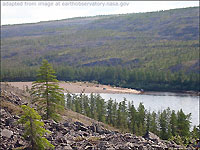NEWSLINK: Despite Moscow’s Promises, Russia’s Far East Remains ‘More Dead than Alive,’ Experts Say

[Despite Moscow’s Promises, Russia’s Far East Remains ‘More Dead than Alive,’ Experts Say – Window on Eurasia – Paul Goble – Nov. 30 – http://windowoneurasia2.blogspot.com/2012/11/window-on-eurasia-despite-moscows.html]
Paul Goble writes, for Windows on Eurasia, about the state of Russian ambitions for development of the Russian Far East:
Yesterday’s meeting of the Russian State Council devoted to the Russian Far East and the Trans-Baikal and chaired by President Vladimir Putin shows that those regions remain “more dead than alive” and, in the words of two analysts, “nothing is being done about this” in Moscow.
In an essay posted on “Expert Online” today, Vasily Avchenko and Aleksandr Popov offer a devastating description of the problems of these regions, the failure of Moscow up to now to address them effectively, and the growing anger of both Putin and regional officials concerning the situation (expert.ru/2012/11/30/nepod_emnyij-vostok/).
The Russian president is “losing patience,” the two said because no decisions taken “up to now have led to radical changes in the social-economic situation of those territories” and there is not “the political will” to overcome what is quite obviously become a serious “institutional crisis.”
Putin apparently is pushing for a new state corporation, to exist in addition to a related Ministry. But there is some kind of friction between the concept raised by Sergei Shoigu and the views of Vyacheslav Shtyrov of the Federation Council:
Putin proposed creating a state corporation for the development of the region, an idea that has been floated for some time but that most had assumed had been dropped following the creation of the Ministry for the Development of the East. Putin said he is now “ready to return to this question.”
Vyacheslav Shtyrov, deputy chairman of the Federation Council, said he backed the idea but added “of course not in the form which Sergey Kuzhgetovich Shoygu proposed.” Shoygu’s idea “in fact” would represent something like the recreation of the NKVD’s Dalstroy which existed in Stalinist times.
Whether a state corporation would be more effective than the ministry is “an open question,” Avchenko and Popov say. Mikhail Tersky, an economist from Vladivostok noted that the effectiveness of either “depends on the people who will work in [them].” But judging from the way Moscow is proceeding, he continued, “there aren’t any such in the Far East” now.
While proposals have centered around special laws and tax frameworks to promote the Far East, some persons from the region reportedly are frustrated enough with a lack of progress to want a new Russian republic created:
Putin and various participants in the meeting proposed special laws and tax policies to help promote the region, but “Kommersant” journalist Andrey Kolesnikov, who attended the session, said that the frustrations of those from the region are now so great that they in effect were saying “Give us a Far Eastern Republic (www.kommersant.ru/doc/2078898).
Also afoot is a move to stop using the term “Far East” in favor of “Russia on the Pacific” to focus more on the concept of being part of the Pacific rim:
That may overstate the level of anger, but many in the enormous region of the Russian Federation east of Baikal are clearly ready to strike out in new directions. One of the potentially most interesting involves proposals to “rebrand” the region as “Russia on the Pacific,” a shift that could lead to very different policies there and in Moscow.
According to scholars at the Far Eastern Division of the Russian Academy of Sciences, “the term ‘Far East’ has outlived its usefulness and does not correspond to the present or even more the future role of the eastern regions of Russia.” It should be dropped along with the ideological baggage it carries (expert.ru/2012/11/30/rebrending-dalnego-vostoka/).
“In the very name ‘Far East,’ Academician Petr Baklanov, who heads Vladivostok’s Pacific Ocean Institute of Geography, says, “there is a certain relativity connected with Eurocentrism” among people in Moscow, an attitude that gets in the way of the expanding involvement of the region with the Pacific Ocean and the countries which live on its shores.
Some commentators are highlighting the fact that parts of the Russian Far East are in proximity to enormous centers of population and economic activity:
But of course, Yuri Avdeyev, a scholar there adds … today within a radius of 1000 kilometers of Vladivostok, there live 300 million people, five times more than live within the same radius of Moscow.
And the GDP of that region is currently “more than 6.6 trillion US dollars, three times more than of all of Russia put together,” he notes. Russia on the Pacific “must be constructed above administrative borders as it is something more than the potential of a specific territory.” It needs specialists, institutions and businesses so that Russia can cooperate with the Pacific Rim.
Clear here to read full article: http://windowoneurasia2.blogspot.com/2012/11/window-on-eurasia-despite-moscows.html
